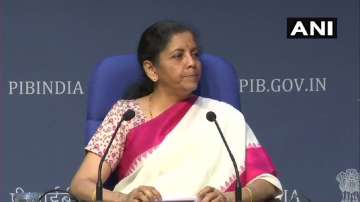In a bid to provide impetus to boosting farmers' income, Union Finance Minister Nirmala Sitharaman announced a set of initiatives and governance reforms, as part of Prime Minister Narendra Modi's vision of 'Aatmanirbhar Bharat', aimed at ramping up agriculture-related infrastructure, improving capacity and put an end to the exploitation of farmers.
Out of 11 announcements made by Sitharaman during the Union Finance Ministry's third press conference as a follow-up to PM Modi's May 12 speech, eight pertained to infrastructure and capacity building in the field of agriculture, while three were governance and administrative reforms aimed at ending the exploitation of farmers in the selling market.
The Union Finance Minister announced a new financing facility of Rs one lakh crore to boost cold chain and post-harvest management infrastructure, with a focus on short-term loans and investments in the long run. "The financing facility of Rs one lakh crore will be provided for funding infrastructure projects at the farm gate and aggregation. The fund will be created immediately," said Sitharaman.
In other major announcements towards improving India’s agriculture infrastructure, Sitharaman revealed:
1. A Rs 10,000 crore scheme for formalisation of micro food enterprises to help unorganised MFEs attain technical upgradation to match FSSAI’s guidelines. Sitharaman said that this would benefit nearly two lakh MFEs.
2. Government’s continued support for Rs 20,000 crore fishermen through Pradhan Mantri Matsya Sampada Yojana (PMMSY), which Sitharaman said would lead to additional fish production of 70 lakh tonnes, including the doubling of exports.
3. Support for the National Animal Disease Control Programme, which has a total outlay of Rs 13,343 crore. Sitharaman said that 53 crore animals had been vaccinated till date, with 1.5 crore cows and buffaloes having been tagged.
4. The government further noted that an Animal Husbandry Infrastructure Development Fund, with an outlay of Rs 15,000 crore, was in place to boost production of animal feed for livestock.
5. Further, banks along the Ganga river would be utilised for growing herbal and medicinal plants. Ten lakh hectares will be covered for the herbal farming over the next two years, with a planned expenditure of Rs 4,000 crore.
6. A bee-keeping initiative to support activities of honey-bee keepers, with an outlay of Rs 500 crore
Among the governance and administrative reforms, Sitharaman said that the Essential Commodities Act, 1955 will be amended to ensure better price realisation for food stuff, including cereals, edible oils, oilseeds, pulses, onions and potatoes. She further stressed on the need to impose stock limits.
The Finance Minister said that the reform in the Act will make provisions for boosting farmers' income.
In another major announcement, the government said that reforms in agricultural marketing to help provide more choices to farmers will go a long way in improving farmers' income. "Farmers are bound to sell agricultural produce only to licensees. Such restrictions on sales is not there on any industrial production," noted Sitharaman.
Sitharaman also said that the government would ensure a legal framework to provide price and quality assurance to farmers, so that they are not exploited in the market at the time of selling their produce.
Latest India News
